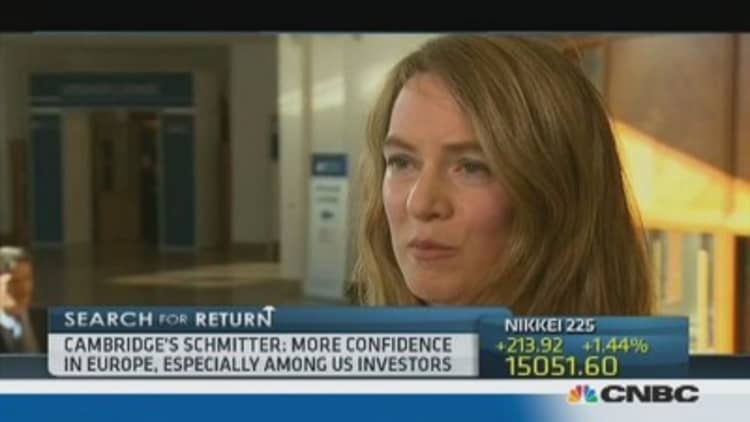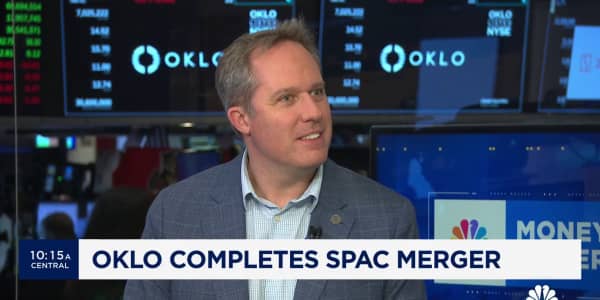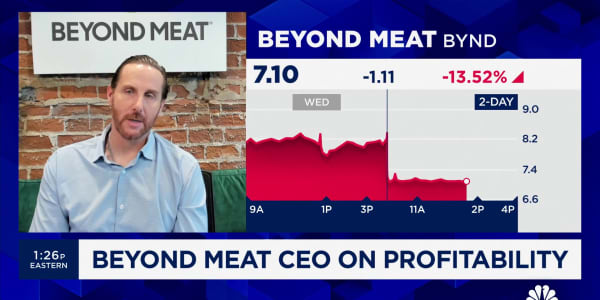Most investors are giving up on the big emerging-market nations. But not everybody.
The headlines on four of the most important emerging-market economies—the so-called "BRIC" nations of Brazil, Russia, India and China—have been decidedly negative. China's once torrid growth has slowed. Russia seems near war, and its political isolation is growing. Brazil has been hit hard by a global drop in commodity prices. And India's economic gains have stalled before important national elections now in progress.
Those problems have translated into investor flight out of the BRICs and other emerging markets, particularly local stocks.
Read More
But as retail investors move out, private equity investors are not following suit, despite recent disappointments.

"You need to have exposure to those markets. You can't ignore them," said Erik Hirsch, chief investment officer at Hamilton Lane, a private equity specialist that directly manages $29 billion and advises on $157 billion for clients.
"To think ... that you can just wait it out for the obvious best (private equity) managers to develop means you'll never get access to them later. You do need to make some positions today, you do need to start some relationships today, you do need to recognize the size and importance of those economies."
While there isn't widespread flight, Hirsch is clear that returns often haven't met the high expectations of investors who poured money into sometimes novice PE firms before the financial crisis in attempts to target the BRICs.
"The performance has not been dazzling, liquidity has been slow in coming in a number of instances, and, in China in particular, the market matured too quickly," Hirsch said.
Read More
Investors with PE allocations aren't as excited about the BRICs as before.
Just 28 percent of those surveyed by data tracker Preqin in December said China was the emerging market that presented the best opportunities, down from 50 percent in December 2010. Brazil was the most exciting for 9 percent of those surveyed, down from 28 percent in 2010. Positive views of Russia and India—much smaller markets for PE—also declined. And BRIC-area fundraising has declined since peaking in 2011, according to Preqin.
But pessimism surrounding the BRICs may actually make them more attractive.
"This potentially could be a better time to put money to work than in the last five years," said Dushy Sivanithy, a principal at Pantheon Ventures, a $28.8 billion fund of private equity funds active in emerging markets.
"Money that goes to work today will probably be at work over the next five years, so you're probably going to invest at an attractive, probable low-cyclical point from a currency perspective," Sivanithy added, using Brazil as an example for the BRICs. "Hopefully you'll enjoy the growth over the next five years, particularly as the economy starts to recover, but also as the currency comes back."
Investors in China, the most important of the BRICs for private equity, still consider it the most attractive Asia-Pacific country for new deals in 2014, according to a recent Bain & Company survey.
About three-quarters of respondents also indicated that China would remain as attractive or become more attractive compared to other countries in the region, such as India, Vietnam, Japan and Australia. They also expected an increase in PE deals and their size as the economy recovers and boosts company valuations and sale prices or potential for initial public offerings, according to Bain.
The most attractive industries for PE investors in China for 2014 are health care, consumer and retail, and information technology, according to the survey. The least attractive were real estate, telecommunications and infrastructure.
"Structurally, the economy that everyone wants to watch and should be watching is China, to see whether they are capable of making a transition to a more consumer-driven economy," David Bonderman, founding partner of private equity firm TPG, said at the Milken Institute's Global Conference in Los Angeles pn April 29.
Read More
In Brazil, market participants have recently noted that finding enough large and attractively priced investments has been difficult; firms have amassed substantial "dry powder," or capital that has been raised from investors but not yet invested.
"Deal activity might have been higher but for the disappointing macroeconomic environment and the fluctuating value of the Brazilian real that combined to drive a wedge between buyer and seller price expectations," a recent Bain report said. "Even though they face increasingly competitive bidding situations, (PE firms) opted to walk away rather than pay a too-high price."
To be sure, some investors are looking to potentially higher growth emerging markets in areas like Southeast Asia and sub-Saharan Africa for better private equity returns.
Read MorePE firms swap BRICs for SE Asia, Africa
Money invested in non-BRIC emerging markets increased 18 percent in 2013, reaching a five-year high of $11 billion and representing 44 percent of total capital invested in emerging markets, according to a recent study by the Emerging Markets Private Equity Association. At the same time, total capital invested in the BRICs declined by 20 percent between 2012 and 2013 and was 38 percent lower than in 2011.
Despite those flows, the BRICs still dominate among emerging markets. China, India and Brazil alone still accounted for more than 50 percent of total capital invested in emerging markets and more than 30 percent of all funds raised, according to the EMPEA report.
Wise investors, experts say, should make up their mind and invest for the long run despite the recent volatility.
"If nothing else, people must get comfortable with the fact that emerging markets will have spikes and troughs and they will be more severe than you'll see in normal, developed markets," Pantheon's Sivanithy said.
"Those private equity investors [who] have been investing in emerging markets for some time [and] will consider that being consistent is probably more important than trying to market time."






